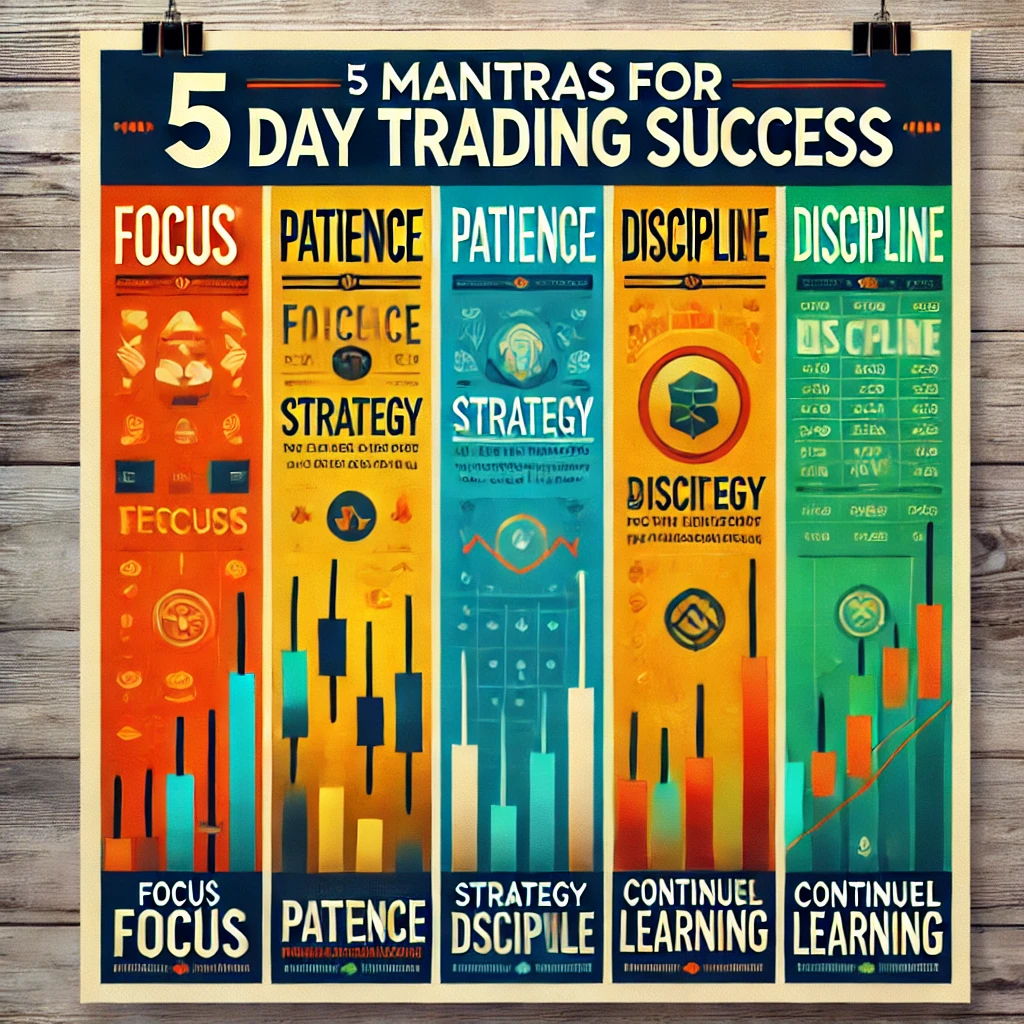Day trading is one of the most demanding and rewarding forms of trading. It requires precision, quick decision-making, and emotional control. After years of trading experience, I’ve learned that success in day trading is not just about using the latest tools or having the most complex strategies. It’s about mastering the core principles that can make you a more consistent and profitable day trader.
Here are the 5 powerful secrets that have helped me achieve success in day trading strategies. Whether you’re a beginner or an experienced trader, these insights will refine your approach and help you stay on track toward consistent profitability.
Pattern Recognition: A Game-Changer
One of the most valuable skills in successful day trading is the ability to recognize and trade patterns. Why? Because patterns repeat over time due to human psychology. People’s reactions to certain price movements are often predictable, and these repeating patterns can provide a high probability of success when traded properly.
Why Patterns Work:
Patterns emerge because traders are driven by emotions—fear, greed, and uncertainty—which cause repetitive behaviors. Once you start recognizing these patterns, you’ll notice that price action trading tends to behave similarly in comparable situations.
How to Master Patterns:
- Save Charts Daily: Track charts of your favorite instruments regularly. Analyze them and categorize the patterns you see.
- Build Familiarity: The more you study and recognize patterns, the more comfortable you’ll become in executing trades based on them.
- Consistency is Key: With repeated practice, pattern trading becomes second nature, enabling you to make quicker and more confident decisions.
Key Takeaway: Mastering patterns is essential. Develop a habit of charting and reviewing regularly to boost your trading skills.
Rule-Based and Discretionary Trading
Successful intraday trading strategies combine strict rules with discretionary decision-making. A structured approach keeps emotions in check, while the ability to make discretionary decisions allows you to adapt to dynamic market conditions.
Avoiding FOMO (Fear of Missing Out):
- Never chase trades. Stick to your pre-defined price levels and trade only when the setup matches your strategy.
- Minimalist Approach: Focus on quality trades, not quantity. Overtrading leads to emotional burnout and poor decision-making.
Patience Over Action:
- Patience is Key: Day trading for beginners isn’t about being in the market all the time. It’s about waiting for the right opportunity, making an entry when the odds are favorable, and executing an efficient exit.
- Emotionally Stable: By limiting the number of trades and focusing on high-probability setups, you maintain emotional stability, which improves overall profitability.
Key Takeaway: A mix of strict rules and flexible decision-making creates a balanced and disciplined approach to day trading success.
Knowing Your Instruments Inside Out
Success in day trading stocks doesn’t come from trading every instrument under the sun. It comes from specializing in a few that you understand deeply. By focusing on a limited number of instruments, you gain an edge because you become familiar with their behavior and nuances.
The Power of Familiarity:
- Consistently trading the same instruments helps you anticipate their moves with greater accuracy. You start to understand how they react to market conditions, making their movements more predictable.
- Expert Inspiration: Renowned traders like Oliver Velez have focused their attention on a select group of instruments, often mastering just a few. You can adopt a similar approach by sticking to a handful of stocks, ETFs, or currencies.
How to Build Expertise:
- Track and analyze the price movements of your chosen instruments.
- Refine your strategy to maximize profits and minimize risks.
Key Takeaway: Specialize in a few instruments to become an expert. Mastering their movements gives you a significant edge over other traders.
Personal Growth and Emotional Discipline
The most crucial factor for day trading profitability isn’t technical—it’s personal. Your trading results mirror your personality and emotional responses. If you struggle with impulsiveness or ego, it will show in your trades.
Self-Improvement:
In the early stages of my career, I struggled with impatience and ego, leading to impulsive decisions. However, recognizing these weaknesses allowed me to work on becoming a more disciplined trader.
Overcoming Emotional Barriers:
- Humble Yourself: Accept that not every trade will be a winner, and avoid the temptation of revenge trading.
- Patience and Discipline: Work on cultivating humility, patience, and emotional control.
- Emotional Neutrality: If a stop-loss is triggered, don’t take it personally.
Key Takeaway: Personal growth is essential for long-term trading success.
Mastering Price Action Over Indicators
In my early trading days, I heavily relied on indicators, but I quickly realized that price action trading strategies are far more powerful. Indicators, while helpful, are often lagging and can cloud your decision-making process.
Why Price Action Rules:
- Real-Time Market Sentiment: Price action charts show how the market feels right now, reflecting real-time sentiment rather than relying on historical data.
- Minimalist Charts: Use simple candlestick charts, support and resistance levels, pivot points, and occasionally moving averages.
Additional Tips for Day Trading Success:
- Avoid Averaging Losses: Don’t add to losing trades.
- Risk-Reward Ratio: Stick to a 1:2 risk-reward ratio for each trade.
- Respect the Profession: Day trading is a serious business.
Key Takeaway: Master price action and use a minimalist chart setup to focus on what truly matters—the price movement and market structure.
Conclusion:
Day trading success is not about constantly making trades or following complex strategies. It’s about discipline, focus, and emotional control. By mastering pattern recognition, following rule-based trading, specializing in a few instruments, working on your personal growth, and focusing on price action, you set yourself up for consistent profitability.
Trading is not just about technical knowledge; it’s about aligning your personality with the demands of the market.


